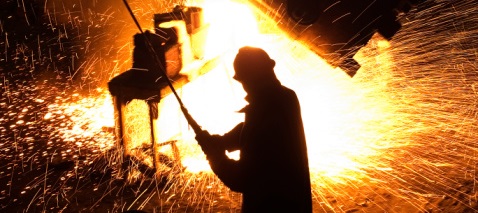Animal welfare spot checks call
Farm animals are being tortured under Britain’s largest farm approval scheme because only one in a thousand inspections are unannounced, leading Unite to call for more spot checks.
Disturbing video shot by undercover animal rights activists shows a worker at the then Red Tractor approved Rosebury Farm in Dunstable, Bedfordshire, swinging piglets by their hind-legs and smashing their heads against a wall.
Workers at the farm were also captured repeatedly shocking terrified pigs with an electric prod, despite the animals being physically blocked from moving in the direction they were supposed to go in.
Red Tractor, which offers a “cast-iron guarantee” of animal welfare and says its branding “is a mark of quality food you can trust”, expelled the farm for breaching its standards following an unannounced inspection given after the film had come to light.
Rosebury Farm, which passed five pre-announced Red Tractor inspections in the last year, is the seventh pig farm in as many months to have been caught breaching the scheme’s animal welfare standards – prompting condemnation of Red Tractor’s practice of informing farms of when inspections will take place.
Red Tractor says 450 inspectors carry out 60,000 checks a year on the 46,000 farms – which account for 75 per cent of UK agricultural production – that are accredited by the scheme.
Time to hide evidence?
However according to The Times only 50 inspections, just 0.8 per cent of the total, conducted in 2017 were unannounced, meaning the overwhelming majority of farms had time to hide evidence of breaches and remove sick and dead animals.
Farmers pay for the inspections out of their own pockets and can choose which inspectors visit their farms.
Following the exposure of Rosebury Farm’s ill treatment of livestock, Red Tractor said it will be setting up a “task force” to consider implemented more unannounced checks, while Michael Thorne, who runs Rosebury Farm, apologised and pledged to improve standards.
Unite national officer for food, drink and agriculture, Joe Clarke, said the “chummy relationship” between Red Tractor inspectors and farmers needs to end.
â€Despicable animal cruelty’
Clarke said, “The public are rightly appalled that this kind of despicable animal cruelty has occurred at a farm that had been Red Tractor approved. With seven incidences of animal welfare breaches occurring at separate Red Tractor pig farms in as many months, clearly there is something amiss with the scheme.
“The chummy relationship between Red Tractor inspectors and farms must stop if the scheme is to be taken seriously. Inspections need to be unannounced to prevent those who are misleading the public about how their livestock are treated from hiding the evidence. It should not be left to animal rights activists and whistleblowers to perform the basic duties of Red Tractor and other assurance schemes.”
Unite member and food security academic Charlie Clutterbuck, who has sat on a number of expert agricultural panels, also highlighted Red Tractor’s dismissal of the welfare of farm workers – who suffer some of the highest workplace injury rates in the UK.
He said, “It’s not just animal welfare but human welfare too. When I represented farm workers on the Health and Safety Executive, the National Farmers Union kept saying Red Tractor farms were safer. We said â€well prove it’. They never did.
“The chief inspector for agriculture went to the Red Tractor board and ask that health and safety be included as one of it standards. He said he wasn’t quite thrown out â€but I was certainly laughed out’. In other words they weren’t interested.”
More unannounced visits call
Clutterbuck seconded the call for more unannounced inspections by Red Tractor, adding that HSE inspectors also need to increase spot checks.
He said, “Unannounced visits are a very cost efficient way of letting the surrounding farming communities know that they have to pull themselves together.”
With uncertainty about the future of food standards under Brexit, a rigorous inspection and standards system for all aspects of farming – including voluntary farm assurance schemes and HSE inspections – is needed more than ever.
Clutterbuck, who has written extensively about the UK’s post-Brexit food security, said plans by right-wing Tories to reject any form of EU customs union deal and open British markets to cheap US imports could result in a race to the bottom in UK food production.
He believes, “It’s not just chlorinated chicken or beef injected with growth hormones, it is white blood cells in milk and cheap corn. The tariffs around a customs union are taxes that are deliberately there to protect our farms and food producers, workers and animals included. Our food and farming standards need to be upheld and we need a customs union for a very good purpose, to keep our countryside alive.”
While Brexit has raised fresh concerns over agricultural, diary and meat standards, interest in sourcing naturally and ethically produced food is not new.
Labels
There is a dizzying array of labels on food products purporting to certify minimum standards, of which the Red Tractor logo is the most common.
The Soil Association, where Unite member and organic pig farmer Peter Melchett is the policy director, lends its logo to certified organic farming produce.
Soil Association certified pork comes from pigs that are kept in conditions that, as far as possible, allow them to express their natural behaviour, including being kept outdoors and in family groups.
“In practice this means that most organic pigs will be outdoors all year round, though indoor housing is permitted in severe weather conditions, provided that there is plenty of straw bedding for the pigs, and continued access to an outdoor run,” a Soil Association spokesperson explained.
“Soil Association organic standards ban several practices that are common in the non-organic pig industry. These include things like tail docking or the routine use of antibiotics.”
 Like
Like Follow
Follow


